
WHAT IS CIDER VINEGAR?
Apple cider vinegar is a versatile ingredient that has found its way into many cuisines around the world. Made from fermented apples or apple juice, this acidic liquid offers a range of flavors and potential health benefits.
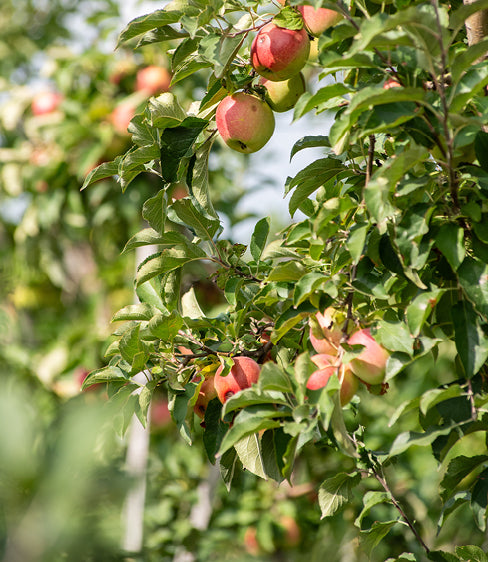
PRODUCTION
The process of making cider vinegar begins with the transformation of apple juice into alcohol through the action of yeast. Then, acetic bacteria come into play to convert this alcohol into acetic acid, which is the main component of vinegar. This fermentation process gives cider vinegar its characteristic flavor and acidity.
FROM APPLE TO PRESSING
Apples are stored, washed, crushed and pressed to extract their juice, which is then filtered to remove impurities, it becomes apple juice.
What makes Archie unique: Our apples come from agroecological orchards, from tall apple trees, a guarantee of quality.
FROM APPLE JUICE TO CIDER THANKS TO ALCOHOLIC FERMENTATION
Apple juice contains natural yeasts and sugars.
These are two elements which allow alcoholic fermentation, which allows the transformation into cider.
What makes Archie unique: We have chosen to opt for natural fermentation, letting our products flourish over the months.
FROM CIDER TO CIDER VINEGAR THANKS TO ACETIC FERMENTATION
Cider is now exposed to bacteria called Acetobacter. These bacteria transform alcohol into acetic acid, during a second fermentation called acetic fermentation.
What makes Archie unique: Our commitment translates into artisanal processing, preserving authenticity without the use of fermentation accelerators

ACETIC ACID
Acetic acid is the main component of apple cider vinegar and is what gives it its acidic taste and good properties.
What makes Archie unique: Unpasteurized, unfiltered, our vinegar therefore preserves “its mother”. It is in this cloud that the concentration of acetic acid is highest.
ITS MANY BENEFITS
-
The skin
- Excema
- Prevents stains
- Fight against acne
- Helps reduce wrinkles
- Balances the pH of the skin
- Fight against dry skin
- Reduces hyper pigmentation
-
The hair
- Shine/radiance
- Reduces sebum
- Fight against lice
- Scalp psoriasis
- Helps reduce dandruff
- Help with hair growth
-
The body
- Antioxidant
- Boost energy
- Helps regulate blood sugar
- Fight against sweating
- Fight against colds
- Help with weight loss
- Against heartburn
- Reduces cholesterol
- Reduces varicose veins
- Improves insulin sensitivity
- Increases the feeling of satiety
- Relieves joint pain
- Stimulates circulation
- Relieves gas
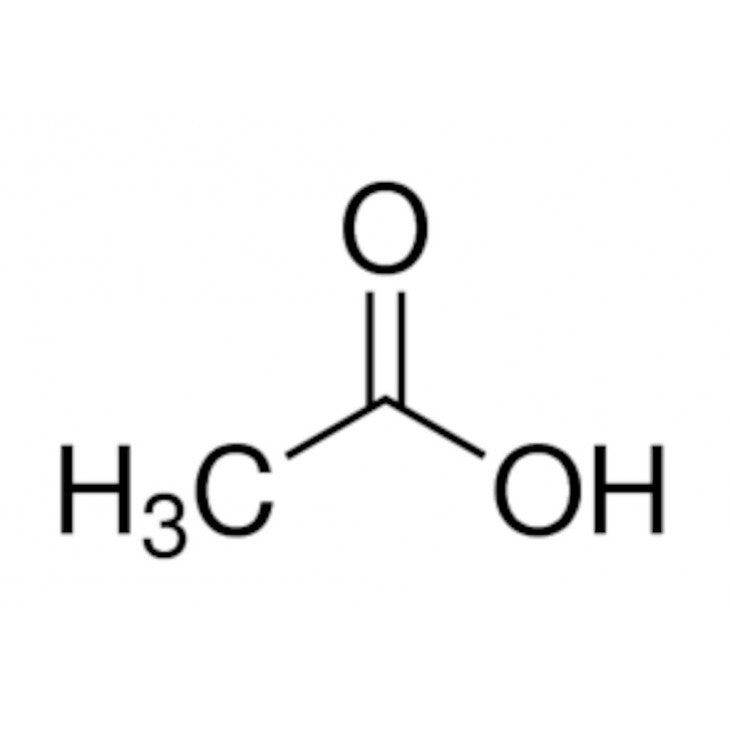
Apple cider vinegar contains acetic acid, a natural component resulting from double fermentation.
Acetic acid is the result of a fermentation process.
What is acetic acid?
Acetic acid is an organic chemical compound with the formula CH3COOH. It is a weak acid commonly found in vinegar, especially apple cider vinegar. Acetic acid is responsible for the sour taste of vinegar and has health-promoting properties, including helping to regulate blood sugar and stimulating the absorption of glucose by muscles.
How does the acetic acid in apple cider vinegar affect our body in relation to blood sugar levels?
Acetic acid slows down the processing of sugars and starchy foods, while stimulating the faster absorption of glucose by our muscles. This reduces the amount of circulating glucose, thereby decreasing blood sugar spikes.
FERMENTATION PROCESS
HOW IT WORKS ?
- Alcoholic Fermentation: It all starts with alcoholic fermentation. Fresh apple juice or pressed apple juice is rich in natural sugars. Yeasts, microorganisms responsible for fermentation, are added to apple juice. These yeasts consume the sugars and convert them into alcohol, a process similar to the fermentation used to produce beer or wine.
- Acetic Fermentation: Once the alcohol is formed, acetic bacteria, generally from the Acetobacter family, intervene. These bacteria convert alcohol into acetic acid through an acetic fermentation process. It is at this stage that the characteristic acidity of vinegar develops.
The duration of fermentation can vary depending on production conditions and the type of cider vinegar you want to obtain. Generally, fermentation can take anywhere from a few weeks to a few months to complete. During this period, acetic bacteria actively work to convert alcohol into acetic acid.
BENEFITS
Apple cider vinegar and its acetic acid are also associated with various health benefits such as:
- Improved digestion: The acetic acid contained in cider vinegar helps give a little boost to stomachs lacking acidity which sometimes seek to overcompensate. As a result, its consumption helps reduce heartburn and bloating. Taken diluted in water after a meal, apple cider vinegar also improves digestion as a whole, facilitating the breakdown of proteins and fats, giving you a feeling of lightness.
- Promote intestinal transit: Apple cider vinegar is rich in prebiotics, nutrients that nourish the good bacteria present in our intestines. However, the intestines are, with the liver, a major organ in the evacuation of waste. Who says good bacteria, therefore says good intestines and good transit, increasing the regularity of stools and the elimination of toxins that the body wants to reject. Limiting digestion time, and therefore fermentation, is also fundamental for good transit.
- Helps with hunger management and weight loss: Apple cider vinegar is an excellent appetite suppressant. Taken diluted in water before a meal, it provides a feeling of satiety and makes you more easily satisfied, reducing the number of calories absorbed. Sipped in water during the day, it also helps fight nasty cravings. Better yet, studies indicate that apple cider vinegar prevents the storage of fats and even promotes their release, as well as that of the waste trapped there, reducing body fat, BMI and serum triglyceride levels.
- Regulate blood sugar: A meta-analysis has shown that a tablespoon of cider vinegar diluted in water before a meal reduces its glycemic impact by 30%, i.e. the quantity of glucose present in our body. blood. Indeed, acetic acid regulates blood sugar and insulin, at the same time limiting the transformation of sugars into triglycerides and the formation of new fat cells. An experience validated in the same way in diabetic people as in non-diabetic people.
- Strengthen the immune system: Known to eliminate bad bacteria, apple cider vinegar is an antibacterial that acts as a 100% natural disinfectant. For example, it helps relieve a slight sore throat or a congested nose. Scientific research has also shown that a healthy intestinal microbiota protects us from the onset of diseases. However, to keep it in good shape and strengthen our immune system, it is important to diversify the sources of good bacteria, like those contained in Archie products.
- Improve skin condition: For skin problems, the secret of cider vinegar lies in its PH, similar to that of healthy skin (around 5): it balances oily skin (alkaline PH greater than 6) and dry skin (acid pH less than 4). Cider vinegar thus promotes the elimination of toxins accumulated on our skin (air quality, pollution, perspiration, etc.) and naturally fights against skin problems, imperfections, redness, tightness and excess sebum. The good bacteria it contains also help maintain a healthy skin microbiome and radiant, toned and glowing skin.
- Taking care of our hair: Apple cider vinegar is a wonderful ally for our hair: it purifies and regulates oily scalps thanks to its PH, it tightens the scales of our hair, giving it softness and shine, it constitutes a natural anti-dandruff spectacular thanks to its anti-bacterial properties and it finally helps to stimulate the growth of our hair.
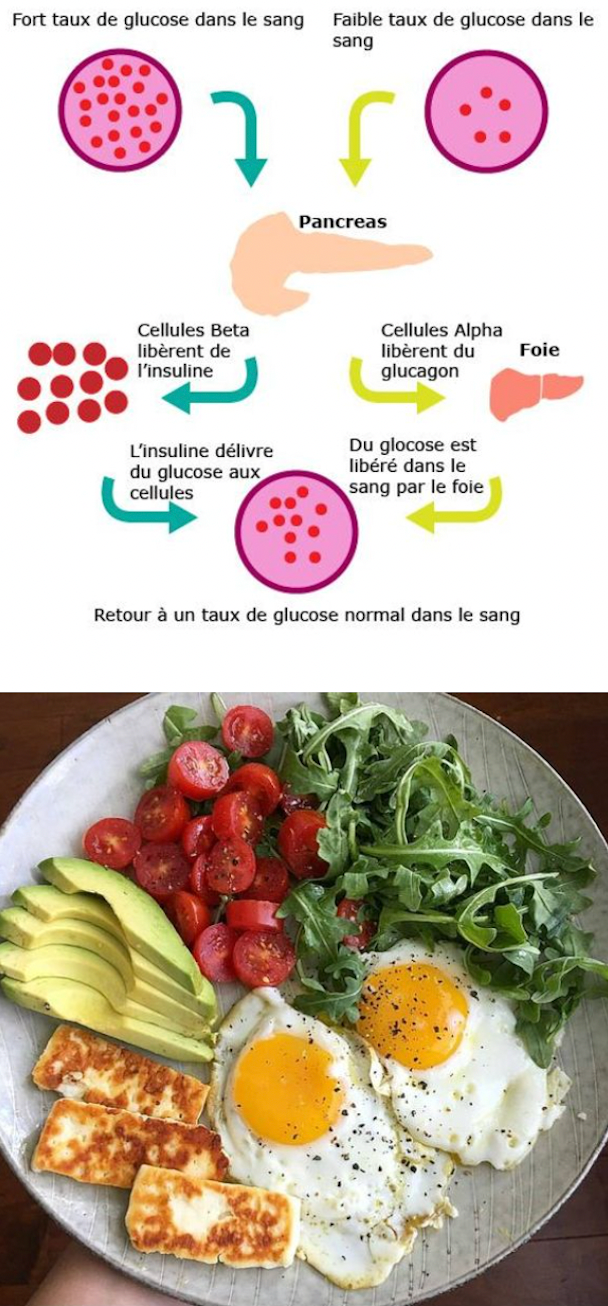
BENEFITS ON GLYCEMIA AND DIGESTION
GLYCEMIA: WHAT IS IT?
Blood sugar, also known as blood glucose level, refers to the concentration of glucose (sugar) in the blood. Glucose is an essential energy source for the body, and its level in the blood is regulated to ensure optimal functioning of the body. (Blood sugar is measured in milligrams of glucose per deciliter of blood (mg/dL) or millimoles of glucose per liter of blood (mmol/L), depending on the units of measurement used in your region.)
Blood sugar levels can vary throughout the day depending on diet, physical activity and other factors. Too high a blood sugar level (hyperglycemia) can be associated with diabetes, while a too low blood sugar level (hypoglycemia) can cause symptoms such as dizziness, tremors, and in severe cases, loss of consciousness.
Blood sugar control is crucial for health, especially for people with diabetes. They often need to monitor their blood sugar closely, adjust their diet, take medications or insulin, and adopt a healthy lifestyle to maintain blood glucose levels within a normal range and prevent diabetes-related complications.
DIABETES
WHAT IS THIS ?
Diabetes is a chronic disease characterized by high levels of glucose (sugar) in the blood. There are several types of diabetes, but the two main ones are type 1 diabetes and type 2 diabetes:
- Type 1 diabetes : Also called juvenile diabetes or insulin-dependent diabetes, type 1 diabetes is usually diagnosed in children and young adults, although it can occur at any age. It is caused by an autoimmune reaction that destroys the beta cells of the pancreas, which are responsible for producing insulin. People with type 1 diabetes need to take insulin daily to regulate their blood sugar levels.
- Type 2 diabetes : Type 2 diabetes is much more common than type 1 diabetes and is often diagnosed in adults, although it can also affect children. In type 2 diabetes, the body either fails to use insulin properly (insulin resistance) or does not produce enough insulin. Risk factors for this type of diabetes include obesity, lack of physical activity, poor diet and a family history of diabetes. Treatment for type 2 diabetes may involve lifestyle changes, eating a balanced diet, losing weight, taking antidiabetic medications, and in some cases, insulin.
Common symptoms of diabetes include excessive thirst, frequent urination, increased hunger, unexplained weight loss, fatigue and blurred vision. If diabetes is not well controlled, it can lead to serious complications, such as cardiovascular problems, nerve damage, kidney problems, eye problems, skin problems, and more. This is why it is essential to monitor and maintain normal blood sugar levels for people with diabetes, as well as those who are at risk of developing the disease.
INSULIN
WHAT IS THIS ?
Insulin is a hormone produced by the pancreas, a gland located in the abdomen, which plays an essential role in regulating blood sugar (blood glucose levels). Insulin allows glucose, which is the main sugar in the blood and an essential energy source for the body's cells, to enter those cells. It acts like a key that opens the doors of cells to allow glucose to enter.
This is how insulin works in the body:
- Blood sugar regulation : When you eat foods containing carbohydrates, your blood glucose levels increase. In response to this increase, the pancreas releases insulin into the bloodstream.
- Stimulation of glucose absorption : Insulin binds to receptors in cells, which activates cellular processes that allow glucose to move from the bloodstream into cells. This reduces the concentration of glucose in the blood, helping to maintain normal blood sugar levels.
- Glucose storage : Insulin also promotes the storage of glucose in the form of glycogen in the liver and muscles. This allows the body to release glucose when blood sugar levels drop, such as between meals or during exercise.
- Inhibition of glucose production : Insulin inhibits the production of glucose by the liver. It prevents the liver from releasing glucose into the blood when glucose levels are already high.
Insulin is essential for proper blood sugar regulation. In the absence of insulin, as is the case in type 1 diabetes, glucose remains high in the bloodstream, which can lead to serious complications. In type 2 diabetes, cells become less sensitive to insulin (insulin resistance), sometimes requiring insulin supplementation or medications to help regulate blood sugar levels.
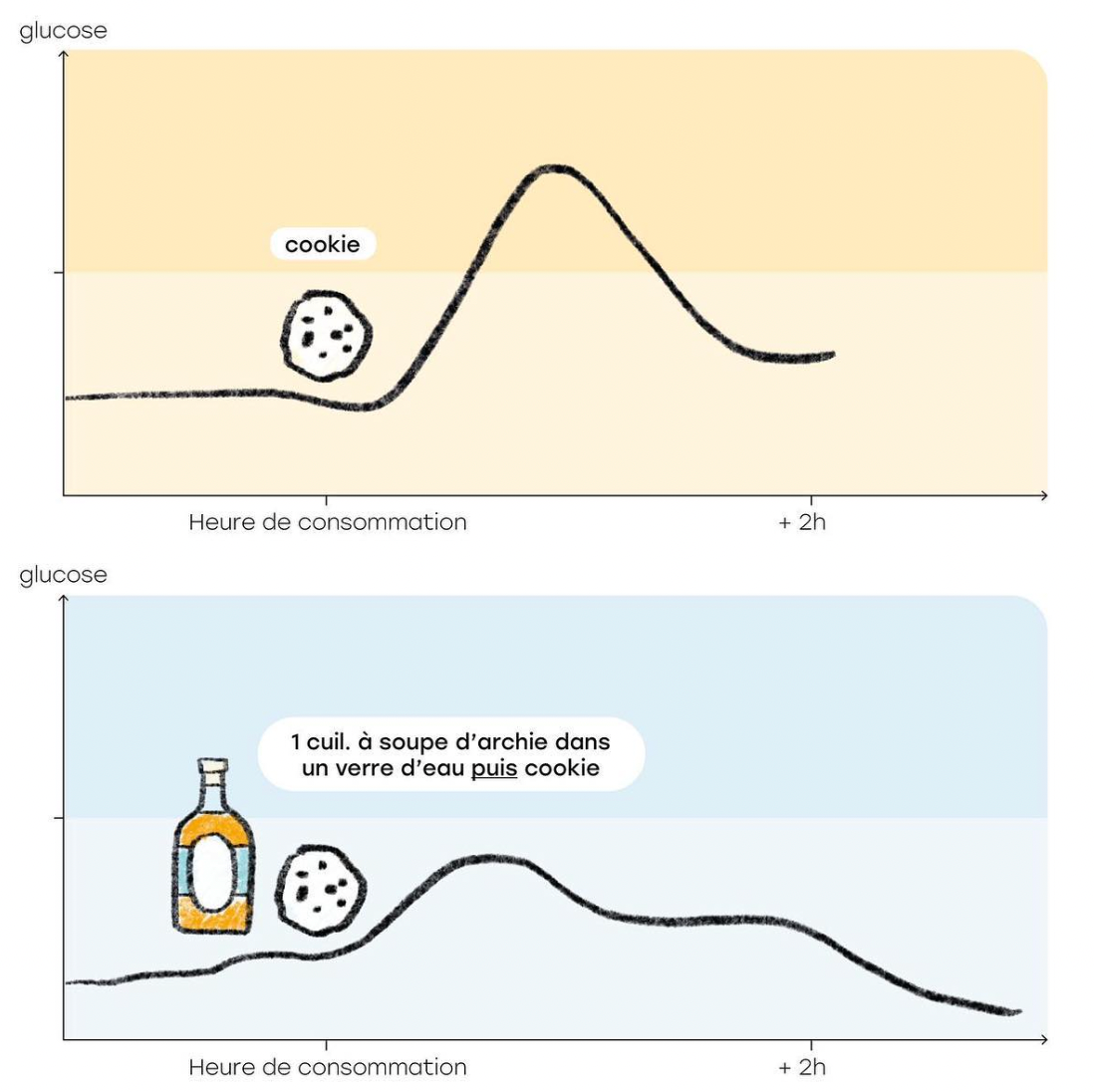
THE ROLE OF VINEGAR
Apple cider vinegar is known for its regulating effect on blood sugar levels.
An in-depth meta-analysis confirmed that a tablespoon of apple cider vinegar, diluted in water before a meal, can reduce the glycemic impact, i.e. the amount of glucose present, by 30%. in the blood.
This regulation is made possible thanks to the action of acetic acid, which is involved in the regulation of blood sugar and insulin. Consequently, this regulation has the effect of limiting the conversion of sugars into triglycerides, as well as the formation of new fat cells.
- Here's how apple cider vinegar influences blood sugar:
Improved insulin sensitivity : Some researchers have suggested that apple cider vinegar may improve insulin sensitivity, meaning the body's cells are more responsive to insulin. This could help lower blood glucose levels, especially in people with type 2 diabetes, who are often insulin resistant. - Slowing Gastric Emptying : Apple cider vinegar can slow stomach emptying, meaning food is digested more slowly and glucose is released into the blood more evenly. This can help prevent blood sugar spikes after meals.
- Reducing the Glycemic Index of Foods : When added to meals, apple cider vinegar can reduce the overall glycemic index (GI) of the meal. Low GI foods are digested more slowly and cause a slower rise in blood sugar after meals.
Regarding its use, to benefit from these regulatory effects on blood sugar, it is recommended to consume a tablespoon of cider vinegar diluted in a large glass of water before each meal, up to three times a day.
THE GLYCEMIC INDEX (GI)
WHAT IS THIS ?
The glycemic index (GI) is a measurement scale that assesses how quickly a food containing carbohydrates affects blood sugar (the level of glucose in the blood) after consumption. The GI assigns a numerical value to each food, generally between 0 and 100, to reflect its impact on blood sugar levels. The higher the GI, the more quickly the food raises blood sugar, while a low GI indicates a slower, more moderate rise in blood sugar.
Here's how IG works:
- High GI (70 or more): Foods with a high GI are quickly digested and absorbed, causing a rapid rise in blood sugar. This can cause blood glucose to spike, followed by a rapid drop, which can lead to food cravings and energy fluctuations. High GI foods include white bread, sugary cereals, candy and soft drinks.
- Medium GI (56 to 69): Foods with a medium GI have a moderate effect on blood sugar. They are digested and absorbed more slowly than high GI foods, allowing for a more gradual rise in blood sugar levels. Pasta, brown rice and fruit are examples of medium GI foods.
- Low GI (55 or less): Low GI foods are digested and absorbed very slowly, leading to a gradual increase in blood sugar. They are often recommended for people with diabetes or for weight management because they help maintain stable blood sugar levels. Examples of low GI foods include vegetables, legumes, unsweetened dairy products, and whole grains.
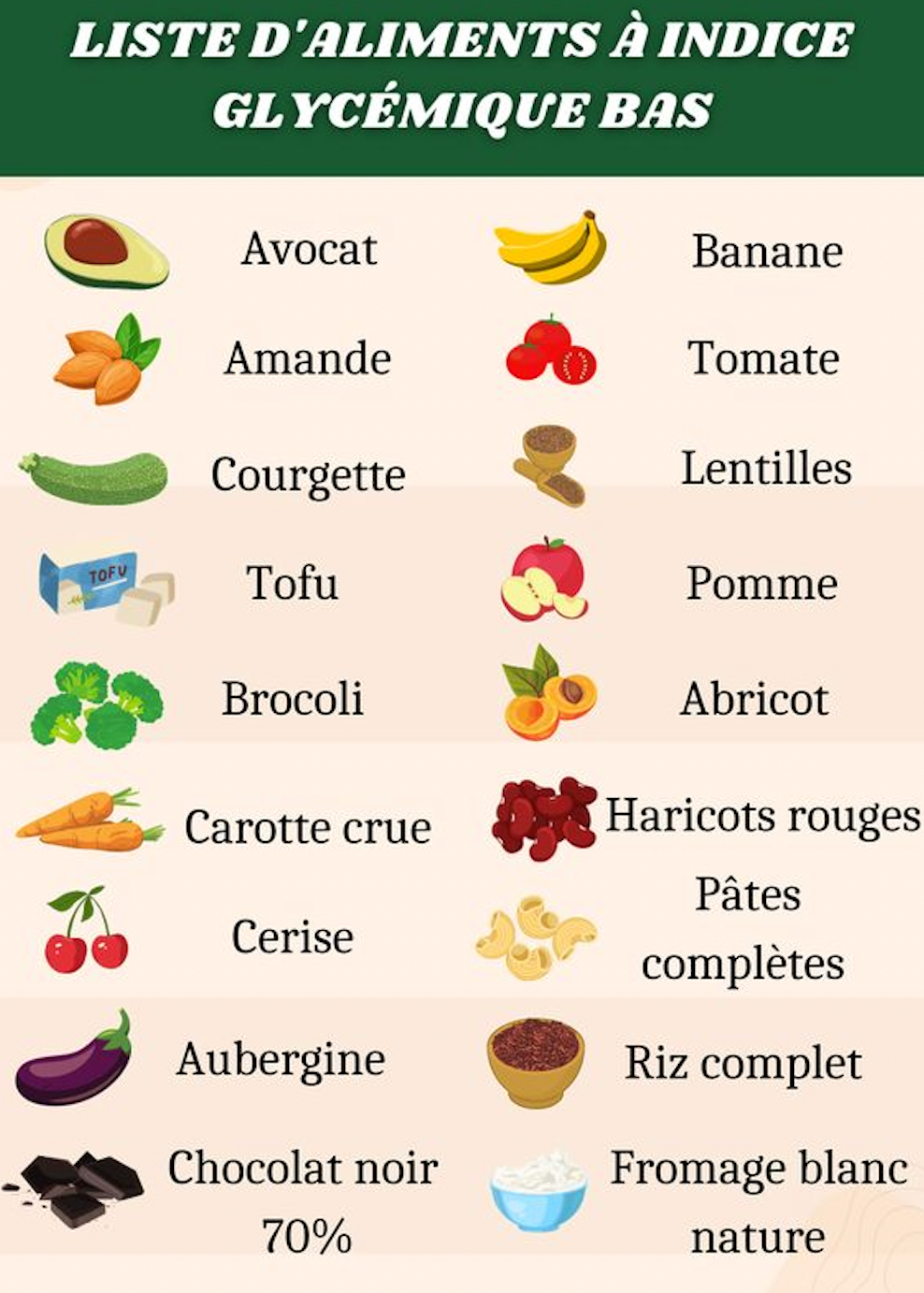
It is important to note that the GI of a food can be influenced by various factors, including food preparation and combination.
For example, eating a high GI food with protein or fat can slow the rise in blood sugar levels. Additionally, the GI does not take into account the total amount of carbohydrates in a food. To get a more complete picture of the impact on blood sugar, it is useful to consider both the GI and the amount of carbohydrates consumed.
GI is often used as a blood sugar management tool, particularly for people with diabetes, but it can also be used as part of a healthy diet to help maintain stable blood glucose levels and prevent cravings.
THE DIGESTION
In France, 80% of the population believes they have difficulty digesting. Apple cider vinegar has many benefits for digestion and stomach health. Here is how apple cider vinegar works on digestion:
- Appetite control : Consumption of apple cider vinegar may play a role in regulating appetite and reducing food cravings.
- Prebiotics : Apple cider vinegar can act as a prebiotic, providing elements conducive to the growth of good bacteria in the gut microbiome.
- Reduced Constipation : Some people have noticed an improvement in bowel regularity after including apple cider vinegar in their diet.
- Stimulation of stomach acid production : Apple cider vinegar is acidic, and its consumption can stimulate the production of stomach acid in the stomach. Adequate stomach acid production is essential for effective digestion because it helps break down food and kill harmful bacteria.
- Reduced bloating : Some claim that apple cider vinegar can help relieve bloating by promoting better digestion of food.
- Improved nutrient absorption : It is suggested that apple cider vinegar may promote the absorption of certain nutrients, such as iron, calcium and magnesium, by increasing stomach acid.
- Glycemic Index Reduction : As mentioned earlier, apple cider vinegar can reduce the glycemic index of foods when consumed with a meal. This can help maintain more stable blood sugar levels after meals, which can benefit digestion.
Regarding its use, to improve your digestion, it is recommended to consume a tablespoon of apple cider vinegar diluted in a large glass of water after each meal, up to three times a day.

HOW TO CONSUME CIDER VINEGAR?
There are various ways to consume cider vinegar, it depends on the objectives and expected benefits.
- In the morning: to provide a boost to the body from the start of the day.
- Before meals: to contribute to weight loss and regulate blood sugar levels.
- After meals: to facilitate digestion and prevent bloating.
- At bedtime: to help you fall asleep.
To drink cider vinegar, we recommend diluting a tablespoon in a glass of water and as a bonus, using a straw, to preserve the enamel of the most sensitive teeth. You can consume up to three spoons of it per day. It is entirely possible to dilute a tablespoon of cider vinegar with sparkling water and add lemon and ginger.

WHY ARCHIE?
HISTORY
Archie is a start-up founded in October 2020 by two childhood friends. Specializing in the marketing of cider vinegar, the objective is to promote its health benefits. Archie's vision is to interest consumers in a product used for its benefits while revitalizing a local region. For this, we only call on seven Normandy cider producers located in the Domfrontais territory and the Pays d'Auge.
All producers have been carefully selected for their organic and agro-ecological production system which uses tall apple trees in pre-orchards allowing cohabitation with cows or sheep. The method of producing cider and then vinegar is entirely natural since no input is added and fermentations take place naturally. Our Archie vinegar is marketed as a high-end, natural product, with the particularity of not being filtered or pasteurized and still containing the mother vinegar.
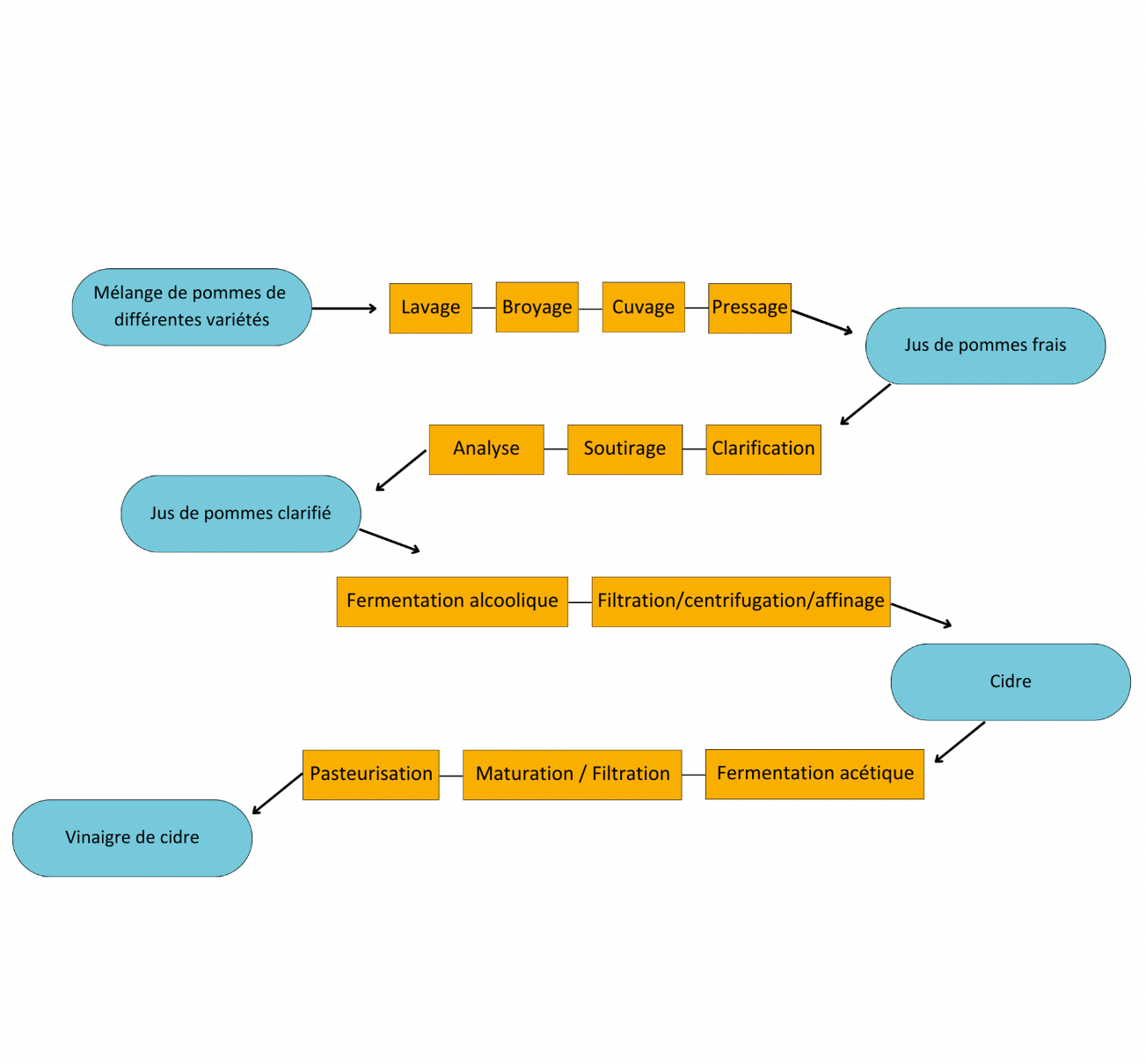
OUR MANUFACTURING PROCESS
From an apple blend to our Archie bottle: How our delicious apple cider vinegar comes to life?
After washing, crushing and pressing the apples to obtain apple juice, a first fermentation takes place, alcoholic fermentation, to transform the apple juice into cider. Then a second fermentation, acetic fermentation to make this cider, cider vinegar.

WHAT MAKES US DIFFERENTIATE?
Our vinegar is distinguished by the following aspects:
- Composition: Our Archie cider vinegar contains the “mother” of vinegar. It contains a concentration of good bacteria, nutrients, minerals and vitamins. This is an indicator that our product is alive, pure, and full of benefits for the body. Unlike industrial vinegars, our vinegar is neither filtered nor pasteurized. In contrast, classic vinegars can be deprived of the "mother", filtered, and subjected to pasteurization, which removes bad bacteria.
- Origins and diversity:
Our vinegar comes mainly from tall apple trees with more than 20 varieties of carefully selected apples and comes from organic farming.
- Our manufacturing process:
Apple cider vinegar undergoes a double fermentation process. The processing time of our cider vinegar is longer, which reinforces its unique qualities. In comparison, traditional vinegars often undergo a simplification of their process.
- Our price :
Our vinegar is distinguished by several essential aspects:
- Careful manufacturing: Unlike industrial cider vinegars, our manufacturing process is careful. We take the time to transform apple juice into cider and then vinegar, thus creating a superior quality product.
- Quality apples: We choose specific apple varieties from high-stemmed orchards. With a wide range of apple varieties, our product acquires a distinctive taste and health benefits of its own.
- High-end packaging: We pay particular attention to the packaging of our vinegar. Quality materials, such as the unvarnished wooden cap and standardized labels, as well as our choice of a high-quality glass bottle, reflect our commitment to excellence.
- Organic by conviction: Our vinegar comes from organic farming in an approach of respect for the environment and of superior quality. We are committed to the quality of our products.
- Support for local agriculture: We work with small independent producers, paid fairly, thus contributing to the preservation of agricultural know-how and the independence of producers.
- Recognized taste qualities: Our vinegar has been awarded the Epicure Prize for several consecutive years and is appreciated by great chefs of French gastronomy. Its exceptional taste is the result of our commitment to quality.
HOW TO CONSUME VINEGAR?
If you want to incorporate apple cider vinegar into your diet, here are some ideas:
- As a salad dressing: Use it as a base ingredient to prepare homemade salad dressings.
- In water: Mix a tablespoon of apple cider vinegar in a large glass of water to make a refreshing drink.
- In marinade: It can add a unique flavor to your marinated meats, fish and vegetables.
- In smoothies: A small amount of apple cider vinegar can spice up your smoothies.
LOW GLYCEMIC RECIPES
Greedy & super light financiers!
-

-
INGREDIENTS
- 20g coconut oil
- 1 beaten egg
- 30g coconut sugar
- 50g almond powder
- The zest of an organic lemon
- 15 g of cut white almonds
- Clean yeast:
-1 case of Archie honey cider vinegar
-1 case of baking soda
-
RECIPE
- Preheat the oven to 170 degrees
- In a salad bowl, mix the dry ingredients
- Add the liquid ingredients
- Add the Clean yeast and mix well
- Pour into financier molds
- Bake for about 20 mins
- Leave to cool, unmold, add almond slivers and some zest and it's ready!
Broco-Pesto buckwheat pasta
-

-
INGREDIENTS
- Buckwheat pasta
- Egg
- For the Broco Pesto:
-1/2 broccoli (the equivalent of 4 small heads)
-2 handfuls of cashew nuts
-1/2 avocado
-15 branches of basil
-1 case of Archie cider vinegar
-
RECIPE
- Cook the dough and the soft-boiled egg (6min) in water
- Meanwhile, cut the heads of the broccoli, reserving a few pieces for dressing
- Mix all the sauce ingredients, add a little water if necessary, add salt and pepper
- Once the pasta is cooked, pour in the sauce and mix well.
- Add a little broccoli as a topping, some herbs and the soft-boiled egg
A “Chico-nut” salad with its creamy Archie vinaigrette
-

-
INGREDIENTS
- 2 endives
- 1 handful of walnuts
- Chives
- Creamy vinaigrette:
-2 tbsp of olive oil or walnut oil
-1 case of Archie Cider Vinegar
-2 cases of tahini
-
RECIPE
- Cut the endives and walnut kernels
- Mix and add the chives
- For the sauce, in a bowl: mix all the ingredients and stir well
- Add to the mixture, it's ready!













